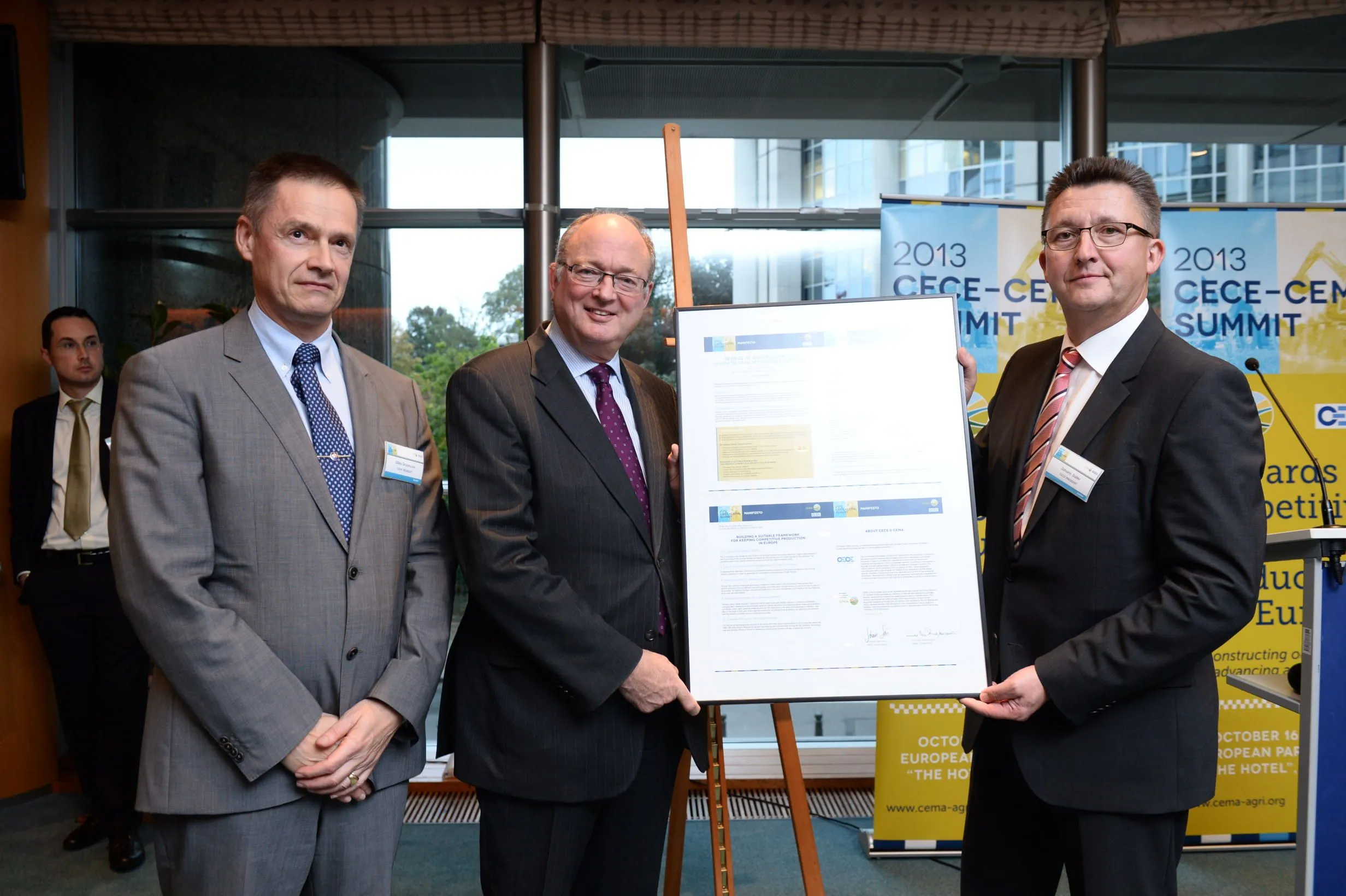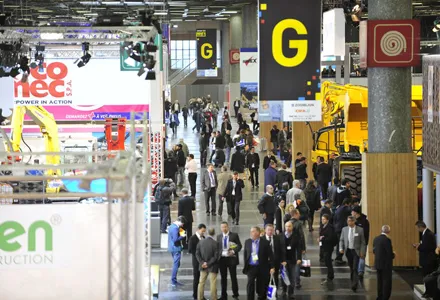The presidents of the CECE and CEMA have handed the European Parliament a 10-point manifesto for securing strong industrial production across Europe.
Doing this, the European construction equipment and agricultural machinery industries underlined that they are committed to playing an active role in reaching the target of the European Commission to raise the share of industry in Europe from 16% GDP to at least 20% by 2020. Both industries maintain important production facilities and R&D sites in Europe.
October 17, 2013
Read time: 3 mins

The presidents of the 3399 CECE and CEMA have handed the European Parliament a 10-point manifesto for securing strong industrial production across Europe.
By doing this, the European construction equipment and agricultural machinery industries are said by both trade associations to have underlined their commitment to playing an active role in reaching the2465 European Commission target of raising the share of industry in Europe from 16% GDP to at least 20% by 2020.
Both construction and agriculture industries maintain important production facilities and R&D sites in Europe.
“We call on the3287 EU to make industrial competitiveness the centre of EU policymaking, and this is our contribution,”said Gilles Dryancour, CEMA president, as he and CECE counterpart Johann Sailer handed the manifesto to MEP Malcolm Harbour, chair of the internal markets committee, European Conservatives and Reformists Group, at the CECE-CEMA Summit on October 16 at the European Parliament in Brussels, Belgium.
Dryancour added: “A strong and competitive industrial production in Europe is essential to drive Europe out of recession and keep our common economic area wealthy and economically successful.”
As global competition is fierce, both industries underlined that the EU needs to set the right framework conditions for them to deliver growth, create jobs and compete at international level. According to the CECE-CEMA manifesto, there are 10 major fields of action:
1. Introduce stronger competitiveness-proofing and fitness checks
2. Ensure more coherent EU policy-making
3. Ensure EU legislation boosts the industry’s ability to innovate to remain ahead of competitors
4. Seek greater international policy alignment to avoid technical barriers to trade
5. Reduce the administrative burden of complying with EU legislation
6. Complete the Internal Market
7. Ensure fair competition through better market surveillance
8. Invest massively in infrastructure
9. Deepen partnerships for a skilled workforce
10. Promote free access to foreign markets
The CECE-CEMA summit was attended by more than 300 participants; industry representatives, EU policy makers and partners of the industry. It was hosted by Amalia Sartori, Member of the European Parliament and chair of the parliament’s important industry committee.
Among the key notes speakers were also Massimo Baldinato, member of the Cabinet of EU Commission’s vice-president Antonio Tajani and on behalf of industry Olof Persson, president and CEO of3970 Volvo Group, and Andreas Klauser, chief operating officer of 6892 Fiat Industrial and brand president of Case IH and Steyr, who outlined the perspectives of the sectors and their requests to politicians.
By doing this, the European construction equipment and agricultural machinery industries are said by both trade associations to have underlined their commitment to playing an active role in reaching the
Both construction and agriculture industries maintain important production facilities and R&D sites in Europe.
“We call on the
Dryancour added: “A strong and competitive industrial production in Europe is essential to drive Europe out of recession and keep our common economic area wealthy and economically successful.”
As global competition is fierce, both industries underlined that the EU needs to set the right framework conditions for them to deliver growth, create jobs and compete at international level. According to the CECE-CEMA manifesto, there are 10 major fields of action:
1. Introduce stronger competitiveness-proofing and fitness checks
2. Ensure more coherent EU policy-making
3. Ensure EU legislation boosts the industry’s ability to innovate to remain ahead of competitors
4. Seek greater international policy alignment to avoid technical barriers to trade
5. Reduce the administrative burden of complying with EU legislation
6. Complete the Internal Market
7. Ensure fair competition through better market surveillance
8. Invest massively in infrastructure
9. Deepen partnerships for a skilled workforce
10. Promote free access to foreign markets
The CECE-CEMA summit was attended by more than 300 participants; industry representatives, EU policy makers and partners of the industry. It was hosted by Amalia Sartori, Member of the European Parliament and chair of the parliament’s important industry committee.
Among the key notes speakers were also Massimo Baldinato, member of the Cabinet of EU Commission’s vice-president Antonio Tajani and on behalf of industry Olof Persson, president and CEO of







